- Home
- Janet Evanovich
Seven Up Page 3
Seven Up Read online
Page 3
“And urgent,” Ziggy added. “Also of an urgent nature.”
They looked at each other and agreed. It was urgent.
“And besides,” Ziggy said. “You got some nosy neighbors. We were waiting for you in the hall, but there was a lady who kept opening her door and looking at us. It made us uncomfortable.”
“I think she was interested in us, if you know what I mean. And we don't do anything funny like that. We're married men.”
“Maybe when we were younger,” Ziggy said, smiling.
“So what's this urgent business?”
“Ziggy and me happen to be very good friends of Eddie DeChooch,” Benny said. “Ziggy and Eddie and me go way back. So Ziggy and me are concerned about Eddie's sudden disappearance. We're worried Eddie might be in trouble.”
“You mean because he killed Loretta Ricci?”
“No, we don't think that's a big issue. People are always accusing Eddie of killing people.”
Ziggy leaned forward in a conspiratorial whisper. “Bum raps, all of them.”
Of course.
“We're concerned because we think Eddie might not be thinking right,” Benny said. “He's been in this depression. We go to see him and he don't want to talk to us. He's never been like that.”
“It's not normal,” Ziggy said.
“Anyway, we know you're looking for him, and we don't want him to get hurt, you understand?”
“You don't want me to shoot him.”
“Yeah.”
“I almost never shoot people.”
“Sometimes it happens, but God forbid it would be Choochy,” Benny said. “We're trying to prevent it from being Choochy.”
“Hey,” I said, “if he gets shot it won't be my bullet.”
“And then there's something else,” Benny said. “We're trying to find Choochy so we can help him.”
Ziggy nodded. “We think maybe he should be seeing a doctor. Maybe he needs a psychiatrist. So we figured we could work together being that you're looking for him, too.”
“Sure,” I said, “if I find him I'll let you know.” After I delivered him up to the court and had him safely behind bars.
“And we were wondering if you have any leads?”
“Nope. None.”
“Gee, we were counting on you to have some leads. We heard you were pretty good.”
“Actually, I'm not all that good . . . it's more that I'm lucky.”
Another exchange of glances.
“So, are you, you know, feeling lucky about this?” Benny asked.
Hard to feel lucky when I've just let a depressed senior citizen slip through my fingers, found a dead woman in his shed, and sat through dinner with my parents. “Well, it's sort of too early to tell.”
There was some fumbling at the door, the door swung open, and Mooner ambled in. Mooner was wearing a head-to-toe purple spandex bodysuit with a big silver M sewn onto the chest.
“Hey dude,” Mooner said. “I tried calling you, but you were never home. I wanted to show you my new Super Mooner Suit.”
“Cripes,” Benny said, “he looks like a flaming fruit.”
“I'm a superhero, dude,” the Mooner said.
“Super fruitcake is more like it. You walk around in this suit all day?”
“No way, dude. This is my secret suit. Ordinarily I only wear this when I'm doing super deeds, but I wanted the dudette here to get the full impact, so I changed in the hall.”
“Can you fly like Superman?” Benny asked Mooner.
“No, but I can fly in my mind, dude. Like, I can soar.”
“Oh boy,” Benny said.
Ziggy looked at his watch. “We gotta go. If you get a line on Choochy you'll let us know, right?”
“Sure.” Maybe.
I watched them leave. They were like Jack Sprat and his wife. Benny was about fifty pounds overweight with chins spilling over his collar. And Ziggy looked like a turkey carcass. I assumed they both lived in the Burg and belonged to Chooch's club, but I didn't know that for certain. Another assumption was that they were on file as former Vincent Plum bondees since they hadn't felt it necessary to give me their phone numbers.
“So what do you think of the suit?” Mooner asked me when Benny and Ziggy left. “Dougie and me found a whole box of them. I think they're like for swimmers or runners or something. Dougie and me don't know any swimmers who could use them, but we thought we could turn them into Super Suits. See, you can wear them like underwear and then when you need to be a superhero you just take your clothes off. Only problem is we haven't got any capes. That's probably why the old dude didn't know I was a superhero. No cape.”
“You don't really think you're a superhero, do you?”
“You mean like in real life?”
“Yeah.”
Mooner looked astonished. “Superheroes are like, fiction. Didn't anyone ever tell you that?”
“Just checking.”
I'd gone to high school with Walter “MoonMan” Dunphy and Dougie “The Dealer” Kruper.
Mooner lives with two other guys in a narrow row house on Grant Street. Together they form the Legion of Losers. They're all potheads and misfits, floating from one menial job to the next, living hand-to-mouth. They're also gentle and harmless and utterly adoptable. I don't exactly hang with Mooner. It's more that we keep in touch, and when our paths cross he tends to generate maternal feelings in me. Mooner is like a goofy stray kitten that shows up for a bowl of kibble once in a while.
Dougie lives several units down in the same row of attached houses. In high school Dougie was the kid who wore the dorky button-down shirt when all the other kids wore T-shirts. Dougie didn't get great grades, didn't do sports, didn't play a musical instrument, and didn't have a cool car. Dougie's solitary accomplishment was his ability to suck Jell-O into his nose through a straw.
After graduation it was rumored that Dougie had moved to Arkansas and died. And then several months ago Dougie surfaced in the Burg, alive and well. And last month Dougie got nailed for fencing stolen goods out of his house. At the time of his arrest his dealing had seemed more community service than crime since he'd become the definitive source for cut-rate Metamucil, and for the first time in years Burg seniors were regular.
“I thought Dougie shut down his dealership,” I said to Mooner.
“No, man, I mean we really found these suits. They were like in a box in the attic. We were cleaning the house out and we came across them.”
I was pretty sure I believed him.
“So what do you think?” he asked. “Cool, huh?”
The suit was lightweight Lycra, fitting his gangly frame perfectly without a wrinkle . . . and that included his doodle area. Not much left to the imagination. If the suit was on Ranger I wouldn't complain, but this was more than I wanted to see of the Mooner.
“The suit is terrific.”
“Since Dougie and me have these cool suits, we decided we'd be crime-fighters . . . like Batman.”
Batman seemed like a nice change. Usually Mooner and Dougie were Captain Kirk and Mr. Spock.
Mooner pushed the Lycra cap back off his head, and his long brown hair spilled out. “We were going to start fighting crime tonight. Only problem is, Dougie's gone.”
“Gone? What do you mean gone?”
“Like he just disappeared, dude. He called me on Tuesday and told me he had some stuff to do, but I should come over to watch wrestling last night. We were gonna watch it on Dougie's big screen. It was like an awesome event, dude. Anyway, Dougie never showed up. He wouldn't have missed wrestling unless something awful happened. He wears like four pagers on him and he's not answering any of them. I don't know what to think.”
“Did you go out looking for him? Could he be at a friend's house?”
“I'm telling you, it's not like him to miss wrestling,” Mooner said. “Like nobody misses wrestling, dude. He was all excited about it. I think something bad's happened.”
“Like what?”
“I don't know. I just have this bad feeling.”
We both sucked in a breath when the phone rang, as if our suspecting disaster would make it happen.
“He's here,” Grandma said at the other end of the line.
“Who? Who's where?”
“Eddie DeChooch! Mabel picked me up after you left so we could pay our respects to Anthony Varga. He's laid out at Stiva's and Stiva did a real good job. I don't know how Stiva does it. Anthony Varga hasn't looked this good for twenty-five years. He should have come to Stiva when he was alive. Anyway, we're still here, and Eddie DeChooch just walked into the funeral parlor.”
“I'll be right there.”
No matter if you're suffering depression or wanted for murder, you still pay your respects in the Burg.
I grabbed my shoulder bag off the kitchen counter and shoved Mooner out the door. “I have to run. I'll make some phone calls and I'll get back to you. In the meantime, you should go home and maybe Dougie will show up.”
“Which home should I go to, dude? Should I go to Dougie's home or my home?”
“Your home. And check on Dougie's home once in a while.”
Having Mooner worry about Dougie made me uneasy, but it didn't feel critical. Then again, Dougie'd missed wrestling. And Mooner was right . . . nobody misses wrestling. At least nobody in Jersey.
I ran down the hall and down the stairs. I bolted through the lobby, out the door, and into my car. Stiva's was a couple miles down Hamilton Avenue. I did a mental equipment inventory. Pepper spray and cuffs in my purse. The stun gun was probably in there, too, but it might not be charged. My .38 was home in the cookie jar. And I had a nail file in case things got physical.
Stiva's Funeral Parlor is housed in a white frame structure that was once a private residence. Garages for the various funeral-type vehicles and viewing rooms for the various dead have been added to accommodate business. There's a small parking lot. Black shutters frame the windows, and the wide front porch is covered in green indoor-outdoor carpet.
I parked in the lot and power-walked to the front entrance. Men stood in a knot on the porch, smoking and swapping stories. They were working-class men, dressed in unmemorable suits, their waists and hairlines showing the years. I moved past them to the foyer. Anthony Varga was in Slumber Room number one. And Caroline Borchek was in Slumber Room number two. Grandma Mazur was hiding behind a fake ficus tree in the lobby.
“He's in with Anthony,” Grandma said. “He's talking to the widow. Probably sizing her up, looking for a new woman to shoot and stash in his shed.”
There were about twenty people in the Varga viewing room. Most of them were seated. A few stood at the casket. Eddie DeChooch was among those at the casket. I could go in and quietly maneuver myself to his side and clap on the cuffs. Probably the easiest way to get the job done. Unfortunately, it would also create a scene and upset people who were grieving. More to the point, Mrs. Varga would call my mother and relay the whole gruesome incident. My other choices were that I could approach him at the casket and ask him to come outside with me. Or I could wait until he left and nab him in the parking lot or on the front porch.
“What do we do now?” Grandma wanted to know. “Are we just gonna go in and grab him, or what?”
I heard someone suck in some air behind me. It was Loretta Ricci's sister, Madeline. She'd just come in and spotted DeChooch.
“Murderer!” she shouted at him. “You murdered my sister.”
DeChooch went white-faced and stumbled backward, losing his footing, knocking into Mrs. Varga. Both DeChooch and Mrs. Varga grabbed the casket for support, the casket tipped precariously on its skirted trolley, and there was a collective gasp as Anthony Varga lurched to one side, bashing his head against the satin padding.
Madeline shoved her hand into her purse, someone yelled that Madeline was going for a gun, and everyone scrambled. Some went flat to the floor, and some surged up the aisle to the lobby.
Stiva's assistant, Harold Barrone, lunged at Madeline, catching her at the knees, throwing Madeline into Grandma and me, taking us all down in a heap.
“Don't shoot,” Harold yelled to Madeline. “Control yourself!”
“I was just getting a tissue, you moron,” Madeline said. “Get off me.”
“Yeah, and get off me,” Grandma said. “I'm old. My bones could snap like a twig.”
I pulled myself to my feet and looked around. No Eddie DeChooch. I ran out to the porch where the men were standing. “Have any of you seen Eddie DeChooch?”
“Yep,” one of the men said. “Eddie just left.”
“Which way did he go?”
“He went to the parking lot.”
I flew down the stairs and got to the lot just as DeChooch was pulling away in a white Cadillac. I said a few comforting cuss words and took off after DeChooch. He was about a block ahead of me, driving on the white line and running stoplights. He turned into the Burg, and I wondered if he was going home. I followed him down Roebling Avenue, past the street that would have taken him to his house. We were the only traffic on Roebling, and I knew I'd been made. DeChooch wasn't so blind that he couldn't see lights in his rearview mirror.
He continued to wind his way through the Burg, taking Washington and Liberty streets and then going back up Division. I had visions of myself following DeChooch until one of us ran out of gas. And what then? I didn't have a gun or a vest. And I didn't have backup. I'd have to rely on my powers of persuasion.
DeChooch stopped at the corner of Division and Emory, and I stopped about twenty feet behind him. It was a dark corner without a streetlight, but DeChooch's car was clear in my lights. DeChooch opened his door and got out all creaky-kneed and stooped. He looked at me for a moment, shielding his eyes against my brights. Then he matter-of-factly raised his arm and fired off three shots. Pow. Pow. Pow. Two hit the pavement beside my car and one zinged off my front bumper.
Yikes. So much for persuasion. I threw the CR-V into reverse and floored it. I wheeled around Morris Street, screeched to a stop, rammed the car into drive, and rocketed out of the Burg.
I'd pretty much stopped shaking by the time I parked in my lot and I'd ascertained that I hadn't wet my pants, so all in all, I was sort of proud of myself. There was a nasty gash in my bumper. Could have been worse, I told myself. Could have been a gash in my head. I was trying to cut Eddie DeChooch some slack because he was old and depressed, but truth is, I was starting to dislike him.
Mooner's clothes were still in the hall when I got out of the elevator, so I gathered them up on my way to my apartment. I paused at my door and listened. The television was on. Sounded like boxing. I was almost certain I'd shut the television off. I rested my forehead on the door. Now what?
I was still standing there with my forehead pressed to the door when the door opened and Morelli grinned out at me.
“One of those days, huh?”
I looked around. “Are you alone?”
“Who'd you expect to be here?”
“Batman, the Ghost of Christmas past, Jack the Ripper.” I dumped Mooner's clothes on the foyer floor. “I'm a little freaked. I just had a shoot-out with DeChooch. Except he was the only one with a gun.”
I gave Morelli the lurid details, and when I got to the part about not wetting my pants, the phone rang.
“Are you all right?” my mother wanted to know. “Your grandmother just got home and said you took off after Eddie DeChooch.”
“I'm fine, but I lost DeChooch.”
“Myra Szilagy told me they're hiring at the button factory. And they give benefits. You could probably get a good job on the line. Or maybe even in the office.”
Morelli was slouched on the couch, back to watching boxing, when I got off the phone. He was wearing a black T-shirt and a cream cable-knit sweater over jeans. He was lean and hard-muscled and darkly Mediterranean. He was a good cop. He could make my nipples tingle with a single look. And he was a New York Rangers fan. This made him just about perfect . . . except for the cop part.
Bob the Dog was on the couch beside Morelli. Bob is a cross between a golden retriever and Chewbacca. He'd originally come to live with me but then decided he liked Morelli's house better. One of those guy things, I guess. So now Bob mostly lives with Morelli. It's okay with me since Bob eats everything. Left to his own devices Bob could reduce a house to nothing more than a few nails and some pieces of tile. And because Bob frequently takes in large quantities of roughage such as furniture, shoes, and houseplants, Bob frequently expels mountains of dog doody.
-->

 Full Scoop
Full Scoop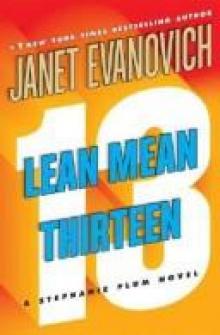 Lean Mean Thirteen
Lean Mean Thirteen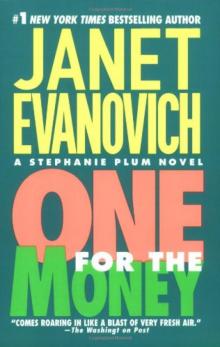 One for the Money
One for the Money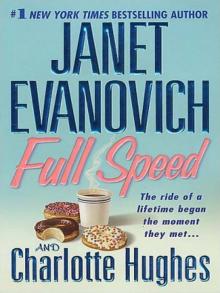 Full Speed
Full Speed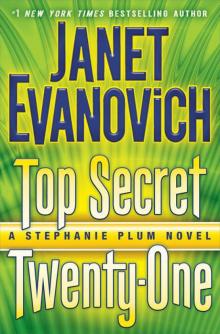 Top Secret Twenty-One
Top Secret Twenty-One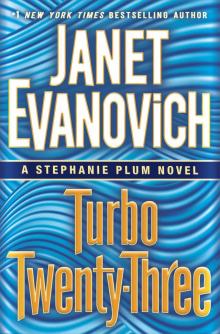 Turbo Twenty-Three
Turbo Twenty-Three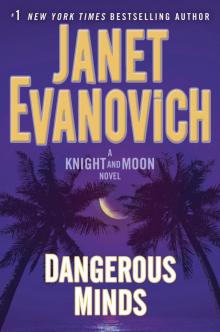 Dangerous Minds
Dangerous Minds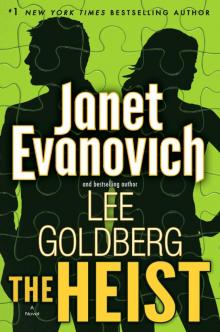 The Heist
The Heist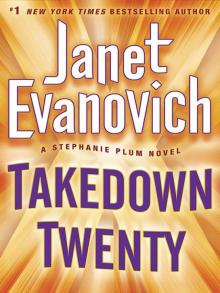 Takedown Twenty
Takedown Twenty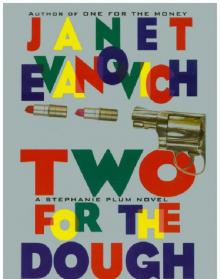 Two for the Dough
Two for the Dough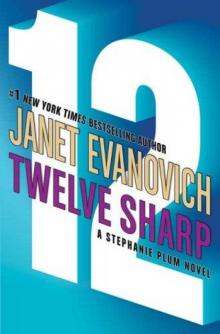 Twelve Sharp
Twelve Sharp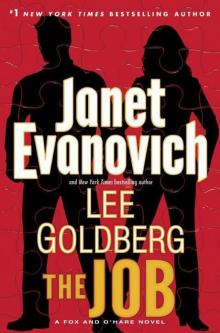 The Job
The Job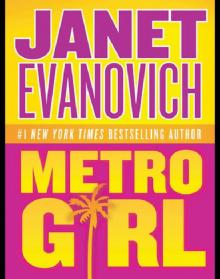 Metro Girl
Metro Girl Full House
Full House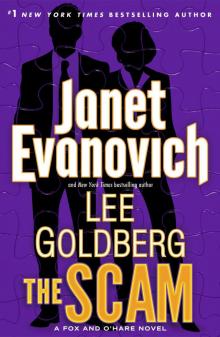 The Scam
The Scam Hot Stuff
Hot Stuff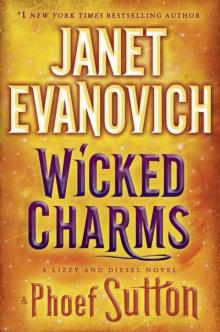 Wicked Charms
Wicked Charms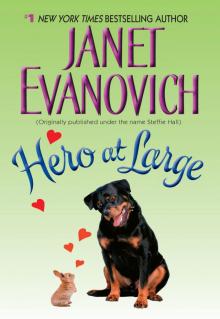 Hero at Large
Hero at Large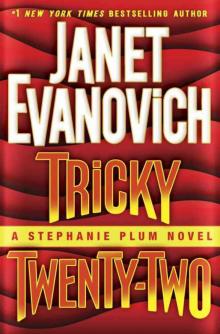 Tricky Twenty-Two
Tricky Twenty-Two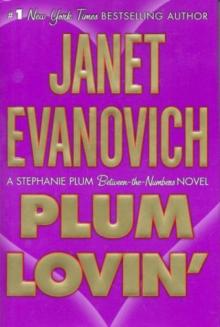 Plum Lovin'
Plum Lovin'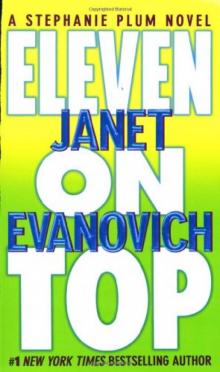 Eleven on Top
Eleven on Top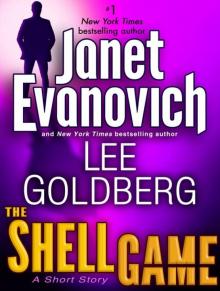 The Shell Game
The Shell Game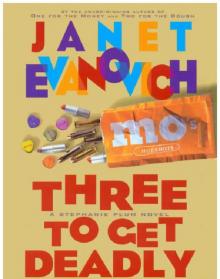 Three to Get Deadly
Three to Get Deadly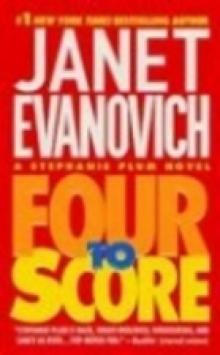 Four to Score
Four to Score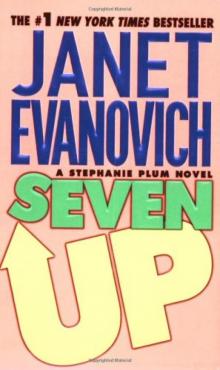 Seven Up
Seven Up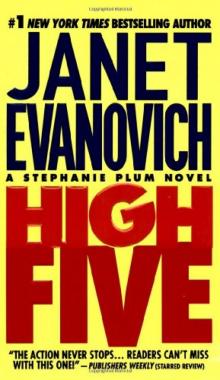 High Five
High Five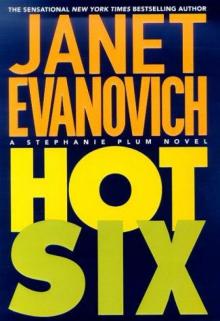 Hot Six
Hot Six The Grand Finale
The Grand Finale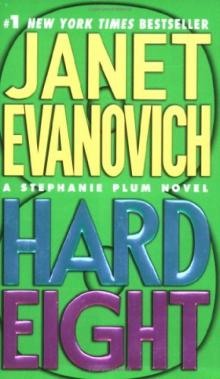 Hard Eight
Hard Eight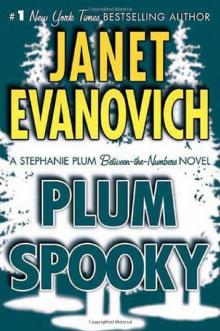 Plum Spooky
Plum Spooky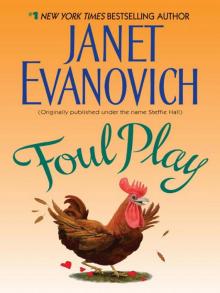 Foul Play
Foul Play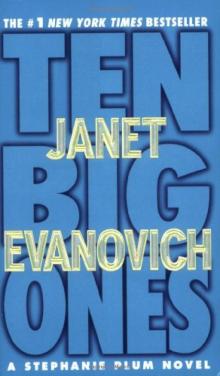 Ten Big Ones
Ten Big Ones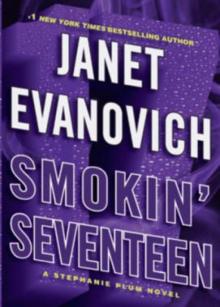 Smokin' Seventeen
Smokin' Seventeen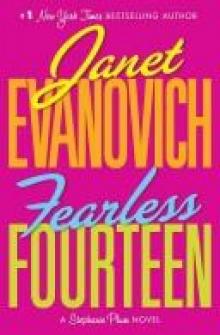 Fearless Fourteen
Fearless Fourteen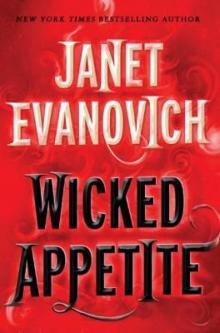 Wicked Appetite
Wicked Appetite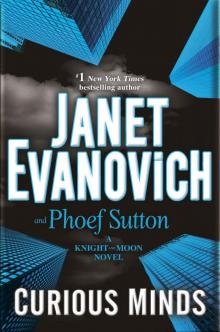 Curious Minds
Curious Minds Sizzling Sixteen
Sizzling Sixteen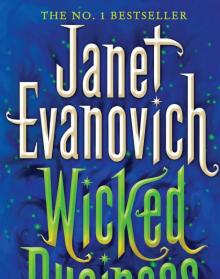 Wicked Business
Wicked Business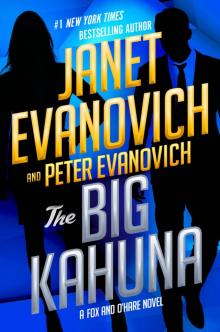 The Big Kahuna
The Big Kahuna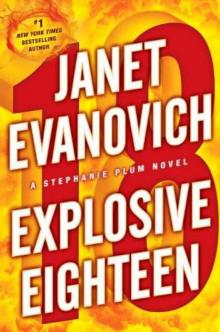 Explosive Eighteen
Explosive Eighteen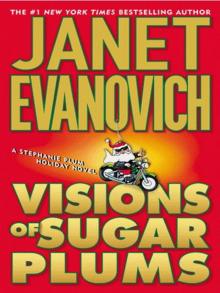 Visions of Sugar Plums
Visions of Sugar Plums Full Blast
Full Blast Back to the Bedroom
Back to the Bedroom Finger Lickin' Fifteen
Finger Lickin' Fifteen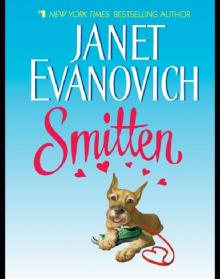 Smitten
Smitten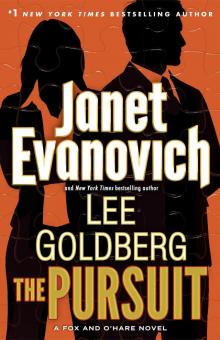 The Pursuit
The Pursuit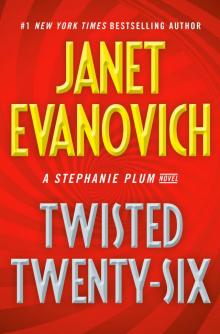 Twisted Twenty-Six
Twisted Twenty-Six Love in a Nutshell
Love in a Nutshell The Chase
The Chase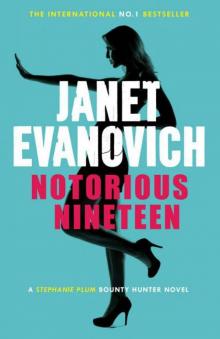 Notorious Nineteen
Notorious Nineteen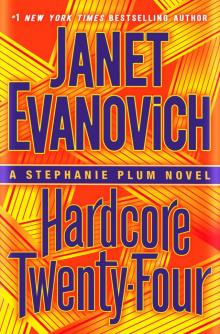 Hardcore Twenty-Four
Hardcore Twenty-Four The Rocky Road to Romance
The Rocky Road to Romance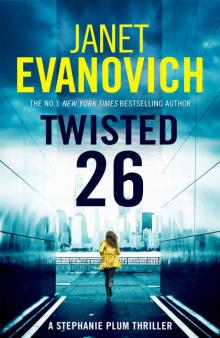 Twisted Twenty-Six (Stephanie Plum 26)
Twisted Twenty-Six (Stephanie Plum 26) Manhunt
Manhunt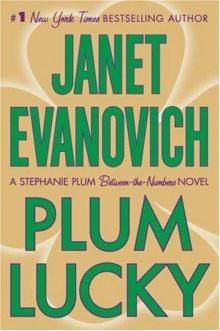 Plum Lucky
Plum Lucky Full Bloom
Full Bloom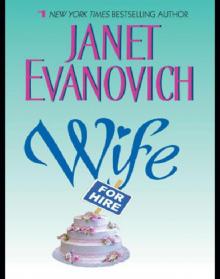 Wife for Hire
Wife for Hire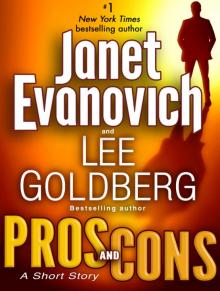 Pros and Cons
Pros and Cons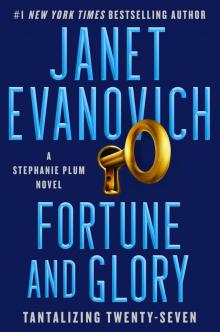 Fortune and Glory
Fortune and Glory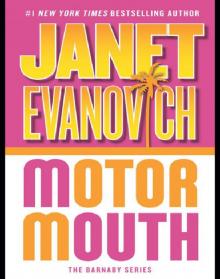 Motor Mouth: A Barnaby Novel
Motor Mouth: A Barnaby Novel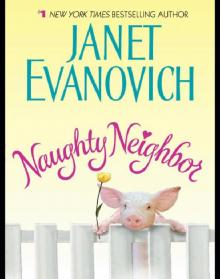 Naughty Neighbor
Naughty Neighbor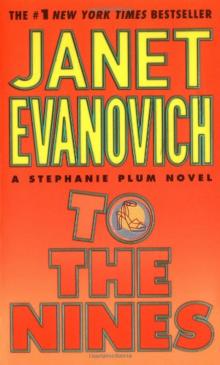 To the Nines
To the Nines The Husband List
The Husband List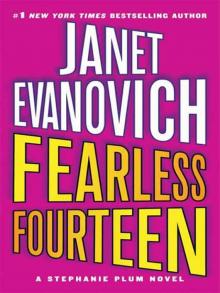 Fearless Fourteen: A Stephanie Plum Novel
Fearless Fourteen: A Stephanie Plum Novel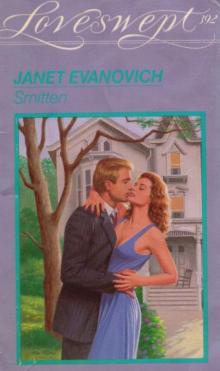 Smitten - LOVESWEPT - 392
Smitten - LOVESWEPT - 392 Plum 12 - Twelve Sharp
Plum 12 - Twelve Sharp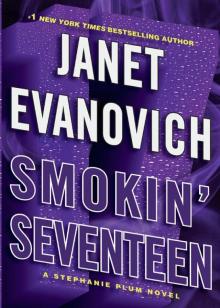 Smokin' Seventeen: A Stephanie Plum Novel (Stephanie Plum Novels)
Smokin' Seventeen: A Stephanie Plum Novel (Stephanie Plum Novels)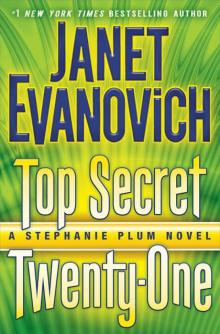 Top Secret Twenty-One: A Stephanie Plum Novel
Top Secret Twenty-One: A Stephanie Plum Novel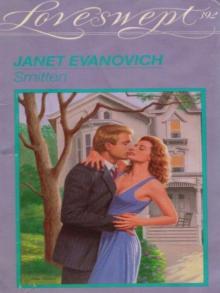 SMITTEN (Loveswept, No 392)
SMITTEN (Loveswept, No 392)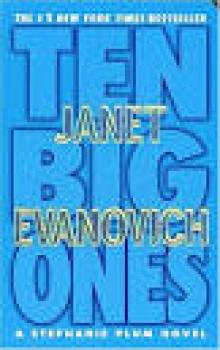 Plum 10 - Ten Big Ones
Plum 10 - Ten Big Ones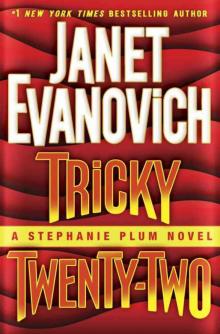 Tricky Twenty-Two: A Stephanie Plum Novel
Tricky Twenty-Two: A Stephanie Plum Novel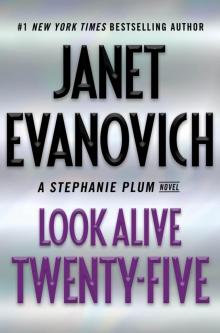 Look Alive Twenty-Five
Look Alive Twenty-Five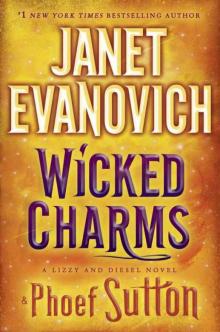 Wicked Charms: A Lizzy and Diesel Novel
Wicked Charms: A Lizzy and Diesel Novel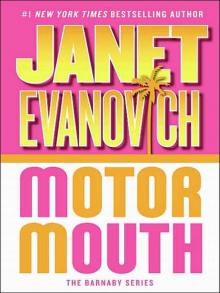 Motor Mouth
Motor Mouth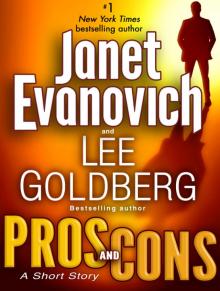 Pros and Cons: A Short Story
Pros and Cons: A Short Story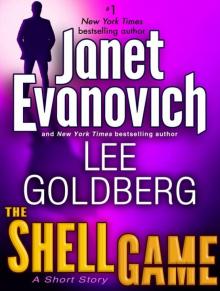 The Shell Game: A Fox and O'Hare Short Story (Kindle Single)
The Shell Game: A Fox and O'Hare Short Story (Kindle Single) Plum Boxed Set 1, Books 1-3 Stephanie Plum Novels)
Plum Boxed Set 1, Books 1-3 Stephanie Plum Novels) Between the Plums
Between the Plums